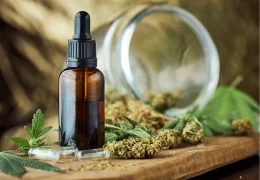As regulations on cannabinoids evolve, 10-OH-HHC is emerging as a legal and promising option. This article aims to...
Blog categories
Search in blog
Popular posts


CBD, short for cannabidiol, is making waves around the world for its potential health benefits and therapeutic properties. In France, where the legal landscape surrounding cannabis products is complex, CBD has gained significant traction. This comprehensive guide aims to provide you with everything you need to know about CBD products in France, from legality and regulations to the variety of products available, consumer trends, and more.
Navigating the legal landscape of CBD in France requires a nuanced understanding of the country's regulations regarding cannabis-derived products. Although CBD is legal in France, provided it contains less than 0.2% THC, the legal framework governing its production, distribution and consumption is complex.
In France, cannabis is classified as a narcotic, and its cultivation, possession and use are strictly regulated. However, CBD products are permitted for sale as long as they meet certain criteria, including THC content restrictions and labelling requirements. Despite the legalisation of CBD, the authorities maintain strict surveillance to prevent abuse and ensure public safety.
The legality of CBD products can vary depending on their intended use. While CBD oils and tinctures are widely available for therapeutic purposes, CBD-containing products for recreational use, such as edibles or vaping liquids, may face stricter regulations. The legal landscape surrounding CBD in France is subject to constant change, with authorities regularly reviewing and updating regulations in response to evolving societal attitudes and scientific research. As such, consumers and businesses need to keep abreast of the latest developments to ensure compliance with the law and mitigate the legal risks associated with CBD products.
In France, consumers have access to a wide range of CBD products, including...
Cosmetics: CBD-infused cosmetics offer skin benefits such as hydration, anti-inflammatory properties and antioxidant protection for healthier, glowing skin.
Oils & Capsules: CBD oils and capsules offer convenient and precise dosing options for users seeking therapeutic effects, ranging from pain relief to stress management.
Edibles: CBD-infused edibles, including jelly beans, chocolates and drinks, offer a tasty and discreet way to consume CBD while enjoying its potential health benefits.
Flowers: CBD flowers, derived from hemp plants, offer a natural source of cannabidiol and can be used for smoking or vaping, providing a relaxing experience.
Resins & Extracts: CBD resins and extracts, such as wax and shatter, offer high concentrations of CBD for powerful effects, ideal for users seeking quick relief.
Concentrated Vaping: Concentrated CBD vaping products offer high doses of cannabidiol quickly and effectively, offering relief from a variety of symptoms such as pain and anxiety.
CBD E-Liquid: CBD e-liquids, designed for use in vaping pens or electronic cigarettes, offer a convenient and customisable way to consume CBD, catering to individual preferences and needs.
Herbal Vaporiser: CBD herbal vaporisers allow users to enjoy the therapeutic benefits of CBD flower without the harmful effects of combustion, providing a cleaner and tastier vaping experience.
Smoking Accessories: Accessories such as rolling papers, filters and grinders complement the consumption of CBD flower, enhancing the smoking or vaping experience for users.
CBD dietary supplements offer a convenient and versatile way to incorporate cannabidiol into your daily routine. From promoting general wellbeing to addressing specific health issues, these supplements can be used in a variety of ways to maximise their benefits.
Stress Relief: CBD's potential anti-anxiety properties make it a popular choice for managing stress and promoting relaxation. Incorporating CBD supplements into your daily diet can help alleviate feelings of tension and promote a sense of calm.
Sleep Support: Many people struggle with sleep problems, such as insomnia or restless nights. CBD has shown promise in promoting better sleep quality and managing sleep disorders. Taking CBD supplements before bed can help improve sleep patterns and overall sleep quality.
Pain Management: CBD's analgesic properties make it an effective option for pain management, whether it's chronic pain, inflammation or discomfort from injury. Adding CBD supplements to your wellness routine can provide natural relief from pain and discomfort.
Mood Enhancement: CBD can also have mood regulating effects, making it beneficial for those suffering from mood swings, low mood or mild depression. Incorporating CBD supplements into your daily routine can help stabilise mood and promote emotional wellbeing.
Digestive Health: CBD has been studied for its potential benefits in supporting digestive health and alleviating symptoms of digestive disorders such as irritable bowel syndrome (IBS) or inflammatory bowel disease (IBD). CBD supplements can help promote digestive balance and reduce gastrointestinal discomfort.
General wellbeing: Even if you don't have any specific health concerns, incorporating CBD supplements into your diet can support general wellbeing and balance. CBD's potential antioxidant and anti-inflammatory properties contribute to overall health and well-being, helping to maintain a healthy lifestyle.
When it comes to buying CBD products in the UK, ensuring quality and safety is paramount. To help consumers make informed choices, here are some essential tips to consider:
Brand Research: Look for reputable CBD brands with a history of transparency and quality. Explore their websites, read customer reviews and learn about their sourcing and manufacturing practices.
Extraction Methods: Pay particular attention to the extraction methods used to produce CBD products. CO2 extraction is widely regarded as the safest and most efficient method, preserving the integrity of the plant's cannabinoids and minimising the risk of residual solvents.
Hemp sourcing: Consider the source of the hemp used to extract CBD. Look for products made from organically grown hemp, preferably from reputable farms in Europe or the USA. Organic hemp is less likely to contain pesticides, herbicides and other harmful chemicals.
Product transparency: Opt for brands that provide full information about their CBD products, including ingredients, dosage recommendations and instructions for use. Transparent labelling instils confidence in consumers, allowing them to make informed decisions about their purchases.
By following these tips, consumers can navigate the French CBD market with confidence, ensuring they find high-quality products that meet their needs and expectations.
In summary, CBD in France intersects legality, accessibility and health benefits. Understanding CBD laws is essential, given France's strict regulations. A wide range of CBD products cater for individual preferences, offering various methods of consumption. Scientific research highlights the potential health benefits of CBD, helping you make informed choices. Finding quality CBD involves checking brands, laboratory tests and extraction methods. Navigating the regulations ensures compliance and safety. Integrating CBD into everyday life offers solutions for wellness needs. Whether online or in-store, consumers are accessing the potential benefits of CBD. Each method has its advantages, contributing to the thriving CBD market in France.